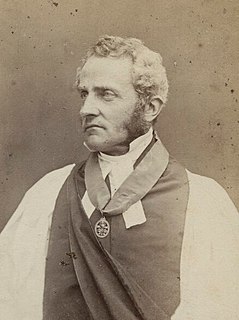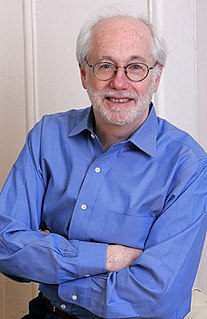A Quote by Steven Pinker
After their return from Babylon, the practice of human sacrifice died out among the Jews, but survived as an ideal in one of its break-away sects, which believed that God accepted the torture-sacrifice of an innocent man in exchange for not visiting a worse fate on the rest of humanity. The sect is called Christianity.
Related Quotes
He in whose heart the law was, and who alone of all mankind was content to do it, His sacrifice alone can be the sacrifice all-sufficient in the Father's sight as the proper sacrifice of humanity; He who through the Eternal Spirit offered Himself without spot to God, He alone can give the Spirit which enables us to present our bodies a living sacrifice, holy and acceptable to God. He is the only High-Priest of the universe.
I want to take the word Christianity back to Christ himself, back to that mighty heart whose pulse seems to throb through the world today, that endless fountain of charity out of which I believe has come all true progress and all civilization that deserves the name. I go back to that great Spirit which contemplated a sacrifice for the whole of humanity. That sacrifice is not one of exclusion, but of an infinite and endless and joyous inclusion. And I thank God for it.
People talk of the sacrifice I have made in spending so much of my life in Africa. Can that be called a sacrifice which is simply paid back as a small part of a great debt owing to our God, which we can never repay? All these are nothing when compared with the glory which shall be revealed in and for us. I never made a sacrifice.
Through inculcating the notion that sacrifice is a virtue, Christianity has succeeded in convincing many people that misery incurred through sacrifice is a mark of virtue. Pain becomes the inignia of morality - and conversely, pleasure becomes the insignia of immorality. Christianity, therefore, does not say, "Go forth and be miserable." Rather, it says, "Go forth and practice the virtue of self-sacrifice." In practical terms, these commands are identical.
. . . an absurd problem came to the surface: 'How COULD God permit that (crucifixion of Jesus Christ)!' . . . the deranged reason of the little community found quite a frightfully absurd answer: God gave his Son for forgiveness, as a SACRIFICE . . . The SACRIFICE FOR GUILT, and just in its most repugnant and barbarous form - the sacrifice of the innocent for the sins of the guilty! What horrifying heathenism!
When a man has offered in sacrifice all that he has for the truth’s sake, not even withholding his life, and believing before God that he has been called to make this sacrifice because he seeks to do his will, he does know, most assuredly, that God does and will accept his sacrifice and offering, and that he has not, nor will not seek his face in vain.
Consider the wave of revulsion that floods the average person when he or she hears of the practice of human sacrifice by the Aztecs and other so-called primitive peoples. How savage and barbaric such practices seem. But when a Christian or Jew comes across human sacrifice in the Bible (see Jephthah's immolation of his daughter in Judges 11:30-40), is he or she repulsed?
There is a great ladder of religious cruelty, and, of its many rungs, three are the most important. People used to make human sacrifices to their god, perhaps even sacrificing those they loved the best ... Then, during the moral epoch of humanity, people sacrificed the strongest instincts they had, their 'nature,' to their god... Finally: what was left to be sacrificed? ... Didn't people have to sacrifice God himself and worship rocks, stupidity, gravity, fate, or nothingness out of sheer cruelty to themselves?



































